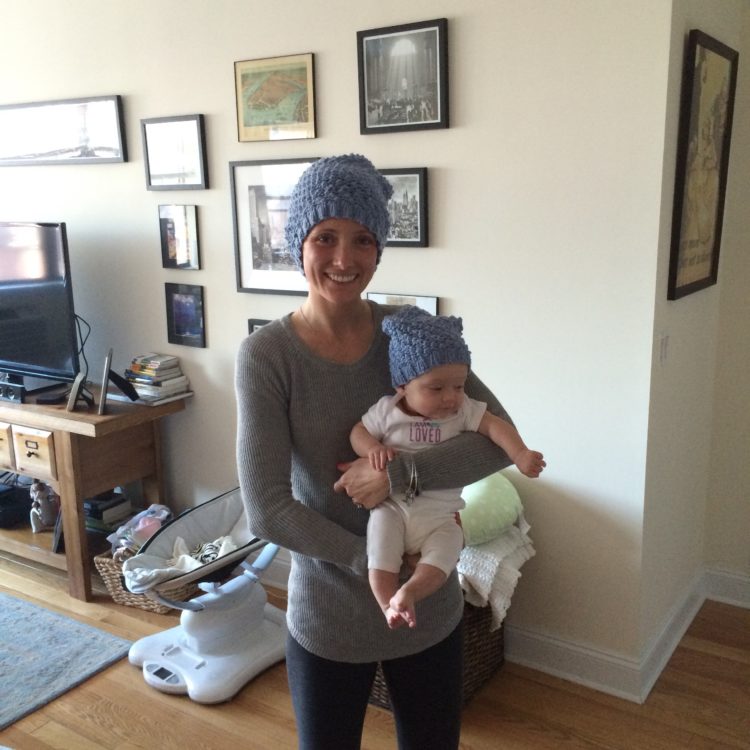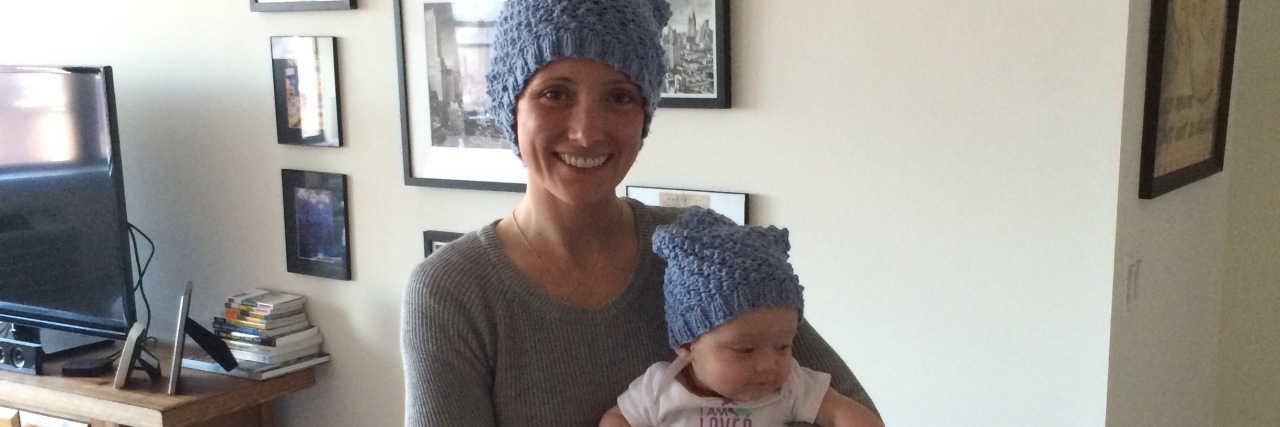Drugs, Hugs, and Losing My Jugs: A Breast Cancer Journal - June 2, 2015 - Recurrence
This is the sixteenth entry in a 31-day Breast Cancer Awareness Month exclusive series featuring the real journal entries of breast cancer survivor, Jessica Sliwerski. Read the previous entry here.
Kyle and I met with my oncologist on May 4. She had the complete pathology report for us that day.
Reviewing my report, this is what I learned about my breast cancer:
Invasive moderately to poorly differentiated ductal carcinoma with mucinous features (1.9cm). Extensive intraductal carcinoma, high grade, solid and cribriform types associated with mucin, necrosis and calcifications. Lymphatic invasion identified. Negative margins. Mucocele like lesion. Nottingham grading system utilized – SBR score 8 (architecture grade 3, nuclear grade 3, mitotic count 2). ER+/PR+. HER2-negative. Lymph node, sentinel biopsy – one lymph node, negative for carcinoma (0/1). Five additional levels are negative for carcinoma.
Say what?
I have a book from my cancer friend, Jessie, called “A Pocket Guide to Cancer.” It was self-published by a pathologist and is riddled with typos that annoy the shit out of me, but has been exceedingly helpful in my quest to understand the details of my disease.
Using this book and the Google machine, I learned:
My tumor was 1.9 cm. This is close to 2 cm and in the world of breast cancer, that’s pretty damn big. However, the size of the tumor plays an important role in staging, so being below 2 is a very good thing because it put me at stage 1.
“In situ” means… Cancer that is staying the fuck put and invasive means that shit is malignant and working its way to blood vessels and lymphatic channels. My cancer was on the highway to hell, as indicated by the phrase “lymphatic invasion identified” (not in my lymph nodes yet, but well on its way).
“Moderately to poorly differentiated” means… My tumor was Grade 2-3. Grade describes how aggressive the cancer is, or how abnormal the cells are. Breast cancer grades are on a scale of 1-3. There are different scoring systems for determining the grade of a breast cancer. My Nottingham SBR score was 8 (9 is the highest), which actually puts my cancer at a solid Grade 3; it was an ugly, aggressive motherfucker.
HER2 is a gene that plays a role in breast cancer. HER2-positive breast cancers tend to grow faster and are more likely to spread and come back compared to HER2-negative breast cancers. I’m HER2-negative. Being HER2-negative is a good thing — a very good thing.
ER+/PR+ means my cancer cells had receptors for estrogen and progesterone. The cancer cells receive signals from estrogen and progesterone that can promote growth. Translation: estrogen and progesterone feed the cancer. It is a good thing that I am hormone positive because it means that after chemotherapy I can take a hormone therapy drug that will trick my cells into thinking they are eating hormones, when really they’re just eating themselves. Ha! Take that, bitches!
When my lymph nodes were biopsied during surgery… There was no cancer in the sentinel lymph node (the first lymph node to which the cancer would have spread), at which point the cancer would have a passport to seriously fuck up some shit everywhere else in my body. Five additional lymph nodes were taken and studied post surgery to be 110 percent certain my lymph nodes were clean. And they were. Thank fucking god.
These characteristics of my breast cancer put me at a solid stage 1a.
When I saw her a week after my mastectomy, my breast surgeon referred to my cancer as a “wolf in sheep’s clothing.” It took me a while to understand what the hell she was talking about. After decoding my pathology, I understand why she said this.
Stage 1a seems innocent enough — my tumor was less than 2 cm and I did not have cancer in my lymph nodes. Throw in that I’m ER+ and HER2- and it’s like I’ve won the breast cancer lottery. I had a double mastectomy that removed all of my breast tissue and thus the entire tumor, so we know for a fact that the cancer is completely gone.
Look a little more closely, though, and shit gets real scary.
The tumor was high grade, it was invasive, it had started to make its way toward my lymph nodes. Cancer cells are microscopic, so knowing these things about my tumor tells the oncologist it is pretty damn likely some of them snuck past the lymph nodes and are floating around in my body, just waiting to binge on hormones and start some fucked up shit.
In fact, my Onctoype DX test (a genomic test that predicts how likely it is I will get cancer again) put me at a 27, which is at the high end of the intermediate range for recurrence. This means I am slightly high risk.
Not great news, but the scale goes up to 100, with 31 being the start of the high risk range.
Add to all of this my age — 33. Because I am half the age of the average woman who gets breast cancer, my chance of recurrence is even higher, simply because I have so many years between now and when I start menopause.
“If I were to have a recurrence, where would it be?” I asked the doctor. “I mean, I don’t have breast tissue anymore, so I couldn’t have breast cancer. Would it come back on my chest wall?”
“Why are you asking this?” she asked, her eyes growing wide with concern. “You should not be thinking about this. Let’s just focus on getting you through the chemo.” She put her hand on my arm.
“Because I need to know. I need to know where it would be. I need you to tell me.”
“Bone, liver or lungs,” she said.
Last night Kyle told me about his distant cousin’s wife who was stage 2 two years ago, was in remission and is now stage 4. I fired a million questions at him, none of which he knew the answer to. I started to panic and needed to take a sedative.
“I knew I shouldn’t have told you,” Kyle said. “I knew you would be upset.”
“You’re right. You shouldn’t have told me,” I said. But it was too late. Now I knew. And if it hadn’t been Kyle telling me about his cousin, it would have been some other woman’s story that would catch me off guard and cause the same reaction.
I can’t stop thinking about this woman. I feel the need to know everything about her initial diagnosis of breast cancer and everything about how she chose to treat it. If I knew, I could compare it to my own and then maybe I could say to myself, “Here are the reasons this will not happen to me.”
At therapy today I talked to my therapist about my fear of recurrence. How I watched my dad fight to remission and then a few months later the cancer was back and it was in his stomach and then he was dead.
How I watched the news this weekend and they talked about Beau Biden, the Vice President’s son, and his brain tumor and how he too made it to remission and then it came back and then he died.
And now Kyle’s cousin’s wife and her cancer was the same type of cancer as mine and it was back and it was now stage fucking 4.
“But your cancer is not anyone else’s cancer,” she said to me in her soft Brazilian accent. “And you have done everything possible as aggressively as possible to treat your cancer. This may not be the case with others. You don’t know. You also don’t know that you will have a recurrence and you cannot invest energy in things that may not even happen in the future. You only know that right now you do not have cancer. You got it out with your mastectomy. It was not in your lymph nodes. And now you are doing chemotherapy to kill everything else.”
As I always do, I left therapy feeling a sense of comfort in my doctor’s wisdom. I know what she said is obvious and when I’m rational, I do tell myself this. But it is so hard to have perspective when I’m totally in it, and it’s scary as shit.

And since having Penelope and becoming a mother, I feel like I have so much more to live for.
All photos courtesy of Jessica Sliwerski

